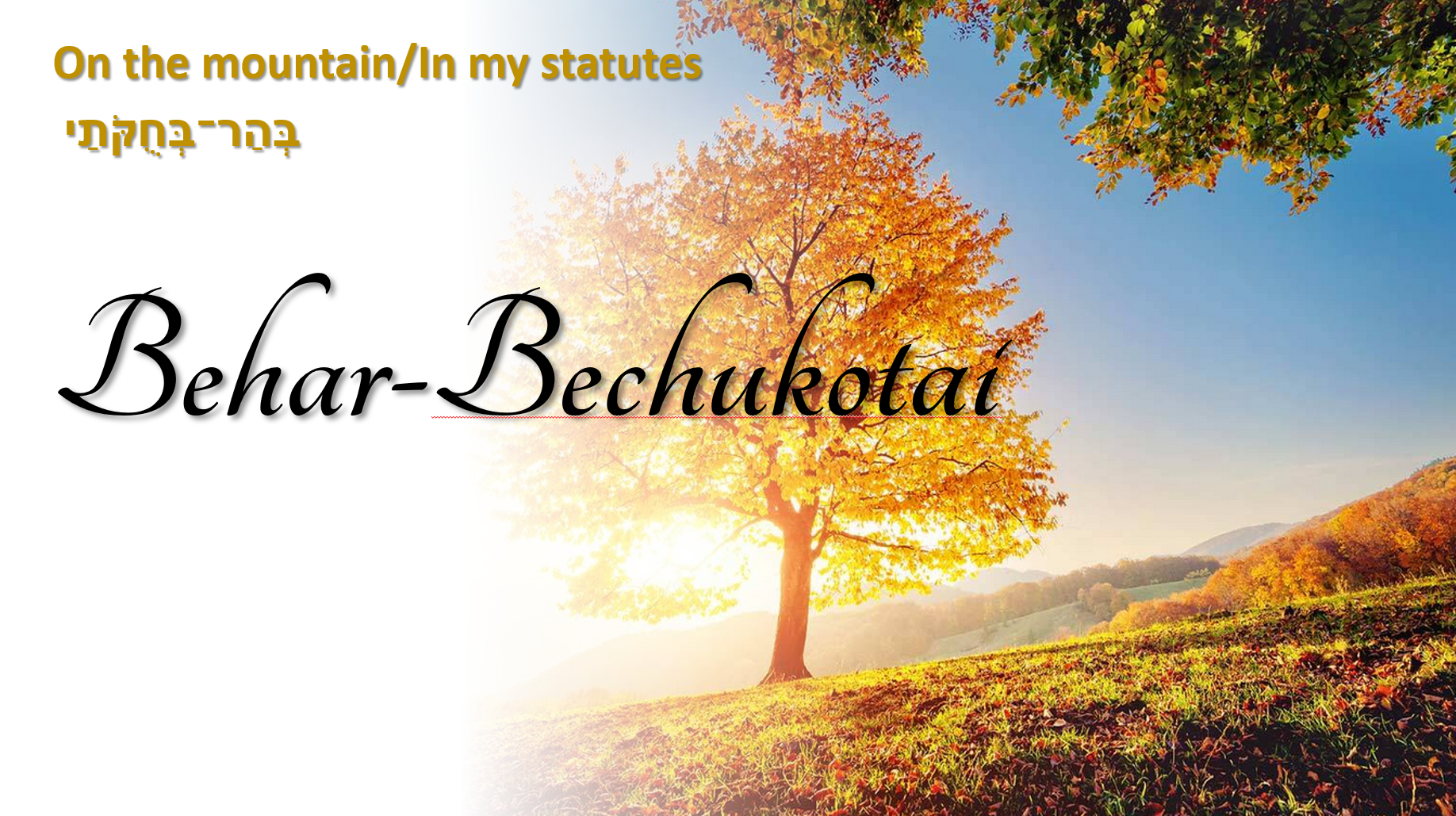| Torah Portion | Haftarah Portion(s) | B'rit Chadashah Portion(s) |
|---|
Leviticus 25.1–27.34 | Jeremiah 16.19-17.14 | Luke 4.14-22 |
| | Matthew 16.20-28 |
| | Acts 1.9-11 |
| | Ephesians 4.8 |
Portion Outline

Torah
Leviticus 25:1 The Sabbatical Year
Leviticus 25:8 The Year of Jubilee
Leviticus 26:1 Rewards for Obedience
Leviticus 26:14 Penalties for Disobedience
Leviticus 27:1 Votive Offerings
Prophets
Jer 16:14 God Will Restore Israel
Jer 17:1 Judah's Sin and Punishment
Jer 17:14 Jeremiah Prays for Vindication
Jer 17:19 Hallow the Sabbath Day
B'rit Chadashah
Luke 4:14, Yeshua begins to preach
Luke 4:16, The people of Nazareth seek to kill him
Matthew 16:21, Jesus foretells his death;
Matthew 16:23, reproves Peter for dissuading him from it;
Matthew 16:24, and admonishes those that will follow him, to bear the cross.
Commentary
-------------------------------------------------------------
Torah Portion Summary(s)
Behar: The thirty-second reading from the Torah and second-to-last reading from the book of Leviticus is called Behar, which means "On the Mountain." The name comes from the first words of the first verse of the reading, which could be literally translated to read, "The LORD then spoke to Moses on Mount Sinai" (Leviticus 25:1). This portion from the Torah introduces the laws of the sabbatical years, the jubilee and laws concerning redemption. In most years, synagogues read Behar together with the following portion, Bechukotai.
Bechukotai: The last reading from the book of Leviticus is called Bechukotai, which means "In My Statutes." The name comes from the first verse of the reading, which begins with the words "If you walk in My statutes ..." (Leviticus 26:3). This last reading from Leviticus promises blessings and rewards for Israel if they will keep the Torah, but punishment and curses if they break the commandments of the Torah. The last chapter discusses laws pertaining to vows, valuations and tithes. In most years, synagogues read Bechukotai together with the preceding portion, Behar.The thirty-first reading from the Torah is called Emor, a title that comes from the first verse of the reading, which says, "Then the LORD said to Moses, 'Speak (emor) to the priests, the sons of Aaron ...'" (Leviticus 21:1). Emor begins with special laws of sanctity, propriety and purity for the priesthood. Leviticus 23 provides an overview of the biblical calendar, a listing of the LORD's appointed times.
Haftarah Portion Summary
The haftarah portion of Behar concerns the redemption of some land by Jeremiah the prophet, just before the Babylonian army (Kasdim) was poised to strike and destroy Judah. By faith Jeremiah paid the redemption price and performed the transaction before the leaders of Judah in order to attest to the word of the LORD that one day the Jews would return to the land and rebuild it: "There will again be buying of homes and fields and vineyards in this Land," for nothing is too difficult for the LORD God of Israel.
Note: The seventy years of Babylonian captivity were punishment for the seventy shemittot Israel missed from the time they entered the land to the destruction of the first Temple (i.e., 490 years). During the captivity God caused the land to receive its appropriate rest by remaining desolate for seventy years.
B'rit Chadashah Portion Summary
The forgiveness of debts and return of slaves on Yovel is called the "Jubilee Release." The Brit Chadashah portion reveals that Yeshua the Mashiach was sent to set the captives free by releasing them from their slavery to sin. Yeshua read these words during an aliyah He performed at the synagogue:
"The Spirit of the Lord is upon me,
because he has anointed me
to proclaim good news to the poor.
He has sent me to proclaim liberty to the captives
and recovering of sight to the blind,
to set at liberty those who are oppressed,
to proclaim the year of the Lord's favor." (Luke 4:18-19)
Yeshua then stated that "Today this Scripture has been fulfilled in your hearing," indicating that He was the Substance of which the ritual was merely a type.
